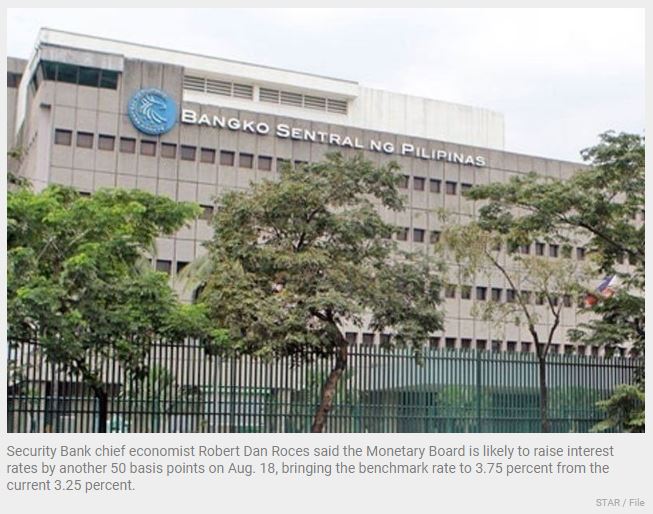Philippines: BSP seen hiking rates by 50 basis points
MANILA, Philippines — Most economists expect the Bangko Sentral ng Pilipinas (BSP) to deliver another 50-basis-point rate hike on Thursday, as monetary authorities remain committed to steer inflation back to the government’s two to four percent target range.
Security Bank chief economist Robert Dan Roces said the Monetary Board is likely to raise interest rates by another 50 basis points on Aug. 18, bringing the benchmark rate to 3.75 percent from the current 3.25 percent.
After aggressively cutting key policy rates by 200 basis points as part of its COVID response measures, the BSP has lifted rates by 125 basis points so far this year, including the huge 75-basis-point increase during a surprise off-cycle rate-setting meeting last July 14, to curb rising inflationary pressures.
Roces said inflation remains the key consideration as it affects growth and thwarts consumption.
According to Roces, the slowdown in the gross domestic product (GDP) growth to 7.4 percent in the second quarter from the revised 8.2 percent in the first quarter would not deter the BSP from further raising interest rates.
“Thus, the deeper-than-expected slowdown in the second quarter GDP is unlikely to deter the BSP from raising interest rates by 50 basis points on Aug. 18,” Roces said.
He said a sticky inflation, which actually weakened private consumption in the second quarter and is poised to do so again this quarter, would compel the BSP to remain hawkish.
“We also expect another 25 basis points in its September meeting before a pause in the fourth quarter to give way for the peak consumption and remittance season,” Roces said.
Despite the easing of oil prices, ANZ head of research in Asia Khoon Goh said inflation quickened to 6.4 percent in July from 6.1 percent in June. At the same time, the country incurred a record high trade deficit of $5.8 billion in July.
Likewise, Goh said the Philippines also booked a balance of payments (BOP) deficit of $3.6 billion in the second quarter, ending four consecutive quarters of surpluses.
“Against such a backdrop, uncertainties surrounding the US monetary policy direction and global growth could exacerbate peso weakness and increase the risks of further inflation. Considering all the above factors, we expect the BSP to deliver a 50-basis-point hike, bringing the policy rate to 3.75 percent,” Goh said.
ING Bank senior economist Nicholas Mapa is also expecting a 50-basis-point increase this week as the BSP continues to be data-dependent.
“Policy flexibility practiced by the BSP suggests that the central bank can hike if warranted and now is the time they can consider staying ahead of the curve with punchy front loaded hikes,” Mapa said.
According to Mapa, monetary authorities would continue to take their cue from data reports including where the US Federal Reserve funds target rate will be and how high inflation remains.
“If the Fed reverses course next and or inflation cools considerably, policy flexibility also means the BSP can start cutting rates to support what will likely be flagging growth momentum. Policy flexibility is of course a two-way street with no bias,” Mapa said.
The Dutch financial giant sees the central bank hiking rates by 25 basis points in the meetings scheduled in September, October, November, and December, bringing the reverse repurchase rate to 4.50 percent by end 2022.
Philippine National Bank economist Alvin Arogo said the BSP is raising interest rates by another 50 basis points on Thursday as inflation remains substantially above the BSP’s two to four percent target range, while the economy is well on its way to recovery in the third quarter.
Arogo said the country’s benchmark interest rate needs to keep up with the US Fed fund rate to prevent the depreciation of the peso against the dollar.
The Lucio Tan-led bank sees the overnight reverse repurchase rate at 4.25 percent by the end of the year.
Bank of the Philippine Islands lead economist Jun Neri said the central bank needs to hike the reverse repurchase rate by 50 basis points despite slower US inflation and slower GDP growth in the Philippines for the second quarter.
“Philippine Inflation does not seem to have peaked yet as global commodity prices have not fallen fast enough to temper expectations,” Neri said.
On the other hand, China Bank chief economist Domini Velasquez is expecting the BSP to deliver a smaller 25-basis-point rate hike on Thursday as underlying inflationary pressures such as oil and food-related prices have started to come down in global markets.
“Our moderate rate hike expectation is also hinged on the lower-than-expected GDP figures, where we saw household spending contract by 2.7 percent quarter-on-quarter. This is despite election-related spending and increasing mobility movements, i.e. move back of BPO workers to offices. The recent GDP figure further demonstrates that demand-pull inflation may not be at work yet in the Philippines,” Velasquez said.
Although July inflation print came out higher-than-expected, Velasquez believes that inflation has not yet peaked, instead, underlying pressures have eased.
“Moving forward, we think that BSP will continue raising rates by 25-basis-point each until it reaches four percent by end of 2022. Our terminal rate is at 4.50 percent possibly in the first trimester of 2023,” Velasquez said.
Source: https://www.philstar.com/business/2022/08/15/2202633/bsp-seen-hiking-rates-50-basis-points


 English
English




